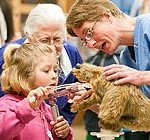Tag School of Veterinary Medicine
Muscle mass maintenance under scrutiny
When muscles are not pressed into service, they begin to lose mass.
Researcher studies monkeys in Africa to better understand virus evolution
Despite the importance of AIDS in human health, scientists still know very little about the diversity and ecology of AIDS-like viruses in nature.
Was mighty T. rex ‘Sue’ felled by a lowly parasite?
A new study, published today (Sept. 29) in the online journal Public Library of Science One, provides evidence that ‘Sue,’ the mighty Tyrannosaurus rex whose fossilized remains are a star attraction of the Field Museum in Chicago, was felled by a lowly parasite that still afflicts modern birds.
School of Veterinary Medicine sponsors 26th annual Dog Jog
Making a difference in the lives of homeless animals is the aim of the 2-mile Dog Jog benefit race set for Sunday, Sept. 20.
UW-Madison’s ‘good ideas’ get lift from stimulus funds
The university has drawn more than $38 million in funding for more than 120 research projects and programs from the American Recovery and Reinvestment Act. The work is spread across the range of academic disciplines, including public health, computer science, psychology, economics and engineering. Funding comes from agencies such as NSF, the National Institutes of Health (NIH), the Department of Energy and the National Endowment for the Arts.
School of Veterinary Medicine sponsors 26th annual Dog Jog
At 10 a.m. on Sunday, Sept. 20, hundreds of animal lovers and their dogs will run (or walk) the two-mile Dog Jog benefit race, sponsored by the School of Veterinary Medicine. Whether participants finish doesn’t matter nearly as much as the amount of money they raise.
Curiosities: Why do cats hate water?
Because we teach them to hate it. There are plenty of cats that love water, according to Sandi Sawchuk, a clinical instructor at the…
Do Chicago’s suburbs hold the key to understanding West Nile virus?
For a group of UW–Madison epidemiologists, the Chicago suburbs near Oak Lawn are proving to be the perfect laboratory for prying loose the secrets of West Nile virus, a pathogen carried by mosquitoes and birds that infects and sickens thousands of people each summer.
Curiosities: Why do cats seem compelled to eat some plants, like my poor aloe, and ignore others?
Cats may devour some plants but ignore others as a simple matter of taste, says Sandra Sawchuk, a clinical instructor at the School…
Veterinary diagnostic lab maintains full accreditation
The Wisconsin Veterinary Diagnostic Laboratory (WVDL) has been granted full accreditation by the American Association of Veterinary Laboratory Diagnosticians (AAVLD).
Recent sightings: Vet Med open house
Photos: Bryce Richter Hayley Rothwell (left) practices the process of intubation using a model of a dog, while clinical instructor Elizabeth…
UW-Madison Veterinary Care to hold open house
The University of Wisconsin–Madison's Veterinary Medical Teaching Hospital will hold its first open house in more than six years on Sunday, April 26, to introduce the public to the many services available through UW–Madison Veterinary Care.
Study of cat diet leads to key nervous system repair discovery
Scientists studying a mysterious neurological affliction in cats have discovered a surprising ability of the central nervous system to repair itself and restore function.
UW faculty recognized by American Academy of Microbiology
Two members of the University of Wisconsin–Madison faculty are among 72 scientists from around the world who have been elected fellows of the American Academy of Microbiology.
Sequences capture the code of the common cold
In an effort to confront our most familiar malady, scientists have deciphered the instruction manual for the common cold.
Vet Medicine launches a new approach to E. coli food safety
Infection by Eschericia.coli O157:H7 from undercooked cattle meat proves deadly to about 60 people in the U.S. each year. While testing is available to detect the presence of the bacterium in raw meat, researchers at the University of Wisconsin–Madison would prefer to address the problem before the meat is sent to market.
Study firms up idea that triceratops used horns in duels with rivals
Because nobody was around to witness their use, the functions of the impressive horns and frill of the familiar dinosaur triceratops have been a matter of speculation.
Scientists isolate genes that made 1918 flu lethal
By mixing and matching a contemporary flu virus with the "Spanish flu" - a virus that killed between 20 and 50 million people 90 years ago in history's most devastating outbreak of infectious disease - researchers have identified a set of three genes that helped underpin the extraordinary virulence of the 1918 virus.
Study works to improve pain relief in pets
A new, injectable pain-relieving drug formulation for animals might eliminate more than pain.
Dog Jog raises more than $29,000 for homeless animals
Despite chilly temperatures and drizzle, hundreds of dog owners raced to benefit homeless animals during the 25th annual Dog Jog on Sept. 14.









